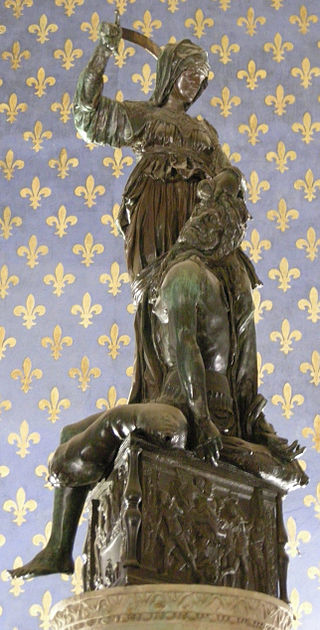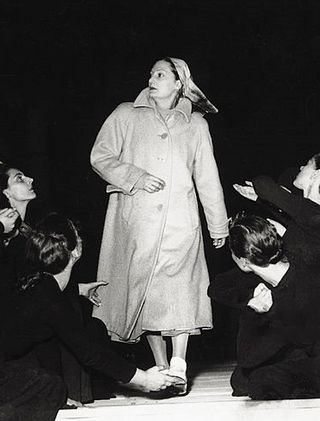
Bartolomeo Pagano was an Italian motion picture actor.

Judith and Holofernes (1457–1464) is a bronze sculpture by the Italian Renaissance sculptor Donatello at the end of his career. It is located in the Hall of Lilies, in the Palazzo Vecchio, Florence, Italy. A copy stands in one of the sculpture's original positions on the Piazza della Signoria, in front of the Palazzo Vecchio.

The account of the beheading of Holofernes by Judith is given in the deuterocanonical Book of Judith, and is the subject of many paintings and sculptures from the Renaissance and Baroque periods. In the story, Judith, a beautiful widow, is able to enter the tent of Holofernes because of his desire for her. Holofernes was an Assyrian general who was about to destroy Judith's home, the city of Bethulia. Overcome with drink, he passes out and is decapitated by Judith; his head is taken away in a basket.

Jia Ruskaja was a Russian dancer and choreographer who established a national dance school in Italy. Her stage name "Jia Ruskaja", which means "I am Russian", was used for the first time by Anton Giulio Bragaglia.

Maciste in the Lion's Cage, also known as The Hero of the Circus, is a 1926 Italian silent adventure film directed by Guido Brignone and starring Bartolomeo Pagano, Elena Sangro, and Luigi Serventi. It was part of the popular Maciste series of films. It was the penultimate film of the silent series, followed by The Giant of the Dolomites (1927).

The Giant of the Dolomites is a 1927 Italian silent adventure film directed by Guido Brignone and starring Bartolomeo Pagano, Aldo Marus and Elena Lunda. It was the last in a series of silent films featuring the peplum hero Maciste, but the character was later revived in the 1960s.
Emperor Maciste is a 1924 Italian silent adventure film directed by Guido Brignone and starring Bartolomeo Pagano, Domenico Gambino and Franz Sala. It was part of the peplum series of silent films featuring the strongman Maciste. The character of Maciste increasingly came to resemble Benito Mussolini, in this case striking Fascistic poses and defending order against criminal and dishonest elements.

Franz Sala (1886–1952) was an Italian film actor who appeared in over seventy films, mostly during the silent era. As his acting career wound down, he began to work as a makeup artist often credited as Francesco Sala. In some of his earliest films he played leading roles, but later often played supporting parts such as in Emperor Maciste (1924).

Maciste against the Sheik is a 1926 Italian silent adventure film directed by Mario Camerini and starring Bartolomeo Pagano, Franz Sala and Felice Minotti. It was part of the long-running Maciste series of Peplum films.
Judith and Holofernes may refer to:
Maciste the Policeman is a 1918 Italian silent film directed by Roberto Roberti and starring Bartolomeo Pagano and Claudia Zambuto.
Maciste the Athlete is a 1918 Italian silent film directed by Vincenzo Denizot and Giovanni Pastrone and starring Bartolomeo Pagano. It is part of the Maciste series.
The Last Tsars is a 1928 Italian silent film directed by Baldassarre Negroni and starring Bartolomeo Pagano, Elena Lunda and Amilcare Taglienti.
Maciste and the Javanese is a 1922 German silent adventure film directed by Uwe Jens Krafft and starring Bartolomeo Pagano, Carola Toelle and Paul Otto. Pagano stars as the strongman Maciste who had already appeared in several of Italian films.
Maciste's American Nephew is a 1924 Italian silent adventure film directed by Eleuterio Rodolfi and starring Bartolomeo Pagano, Diomira Jacobini and Alberto Collo. It was part of the long-running Maciste series of films.
Maciste and the Chinese Chest is a 1923 German silent action film directed by Carl Boese and starring Bartolomeo Pagano, Rudolf Lettinger, and Jakob Tiedtke. It was one of several German films featuring the Italian peplum hero Maciste.
Maciste and the Silver King's Daughter is a 1922 German-Italian silent epic film directed by Luigi Romano Borgnetto and starring Bartolomeo Pagano, Helena Makowska and Ludwig Hartau. It was one of a series of films featuring the character of Maciste.
Maciste and Prisoner 51 is a 1923 German silent action film directed by Luigi Romano Borgnetto and starring Bartolomeo Pagano, Karl Beckersachs and Karl Falkenberg. It was one of several German films featuring the Italian peplum hero Maciste.
The Revenge of Maciste is a 1921 Italian silent adventure film directed by Luigi Romano Borgnetto and starring Bartolomeo Pagano, Henriette Bonard and Erminia Zago. It is part of the series of Maciste films.
Maciste on Vacation is a 1921 Italian silent adventure film directed by Luigi Romano Borgnetto and starring Bartolomeo Pagano, Henriette Bonard and Gemma De Sanctis. It is part of the series of Maciste films.







